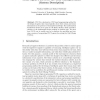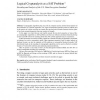855 search results - page 98 / 171 » Using First-Order Logic to Reason about Policies |
IFM
2009
Springer
13 years 6 months ago
2009
Springer
Abstract. The complete specification of full contracts -- contracts which include tolerated exceptions, and which enable reasoning about the contracts themselves, can be achieved u...
CLIMA
2006
13 years 10 months ago
2006
FLUX is a declarative, CLP-based programming method for the design of agents that reason logically about their actions and sensor information in the presence of incomplete knowledg...
IEEEHPCS
2010
13 years 7 months ago
2010
Model checking is a formal verification method widely accepted in the web service world because of its capability to reason about service behaviors, at their process-level. It ha...
ICTAI
2007
IEEE
14 years 3 months ago
2007
IEEE
We review a method of generating logical rules, or axioms, from empirical data. This method, using closed set properties of formal concept analysis, has been previously described ...
JAR
2000
13 years 8 months ago
2000
Cryptographic algorithms play a key role in computer security and the formal analysis of their robustness is of utmost importance. Yet, logic and automated reasoning tools are seld...


